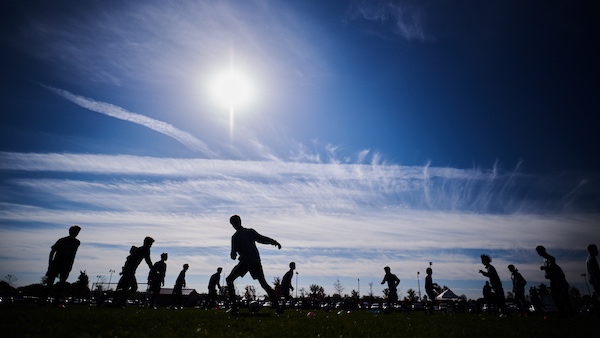Dure: Simple advice for dealing with youth soccer tryout season

 Tryouts stink. Let’s not kid ourselves and pretend. Reducing children to numbers and putting them in artificial playing environments is not a fun thing to do.
Tryouts stink. Let’s not kid ourselves and pretend. Reducing children to numbers and putting them in artificial playing environments is not a fun thing to do.
As the “Hey, He Knows Soccer” person in my circle of friends, I get inundated at this time of year with people asking questions. Some are legitimate — we’re new to travel, we’re considering a couple of different clubs with different philosophies, etc. Some are simply a product of deeply flawed systems for selecting players.
Every situation is different. The college prospect has different needs than the 8-year-old just looking for a new challenge. Some families don’t mind the occasional four-hour drive for a league game; some do. Some kids are athletes who need to learn soccer skills; some kids are fluent in soccer and need coaches who’ll be patient while they catch up in terms of speed and strength.
If I can offer one over-arching piece of advice for all parents and coaches, it’s this:
This is supposed to be about the kids.
Sounds obvious, doesn’t it? But it’s so easy to forget.
Sure, parents can have legitimate concerns (see “four-hour drive for a league game” above). But as a parent, you want the kid to take ownership of the process. And as a coach, you want to get to know the kid.
How many us have seen clubs run “blind tryouts” — taking no information from their recreational coaches or those who’ve seen them in other programs — and then be shocked the next season when they have a bunch of athletes who don’t really care about soccer? Coaches who think they can figure out which kids have good attitudes and coachability from a couple of tryout sessions with 80 kids on the field are kidding themselves.
The best tryouts are only part of the selection process. Ideally, coaches get to see players in practice and game environments, just as a pro coach would see a player on “trial.” They’ll get the whole picture — skills, athleticism, attitude. And parents will get a chance to see how the kids fit in with the coach and the other players.
“Not looking for the best players,” said Herb Brooks — at least, the Hollywood version of the 1980 U.S. hockey coach in the film Miracle. “I’m looking for the right ones.”
It’s still a stressful process, no matter how you do it. If finding the “right” people in one’s life were easy, the romantic comedy genre wouldn’t exist.
A lot of kids pick up on the stress of their parents. Or they start to pick up on the cues at tryouts, as in this list of sample kids’ comments a fellow parents passed on to me.
“Was I playing with the strong players? Is that good?”
“Why did they put me over there? What does that mean?”
“They missed my best plays, and when they looked over, of course I screwed up.”
What you rarely hear: “I had fun!”
But sometimes, you can get lucky. You can disguise the process so that it is fun. Maybe not for the parents or coaches, but let’s go back to what we said earlier:
This is supposed to be about the kids.
Here’s a bit of what I wrote for Single-Digit Soccer about a training session before tryouts:
I’m sitting on the stage of a church gym in early spring, and I’m worried.
There’s a boy on the court who loves to play soccer. He’ll try out for travel with them in a couple of months.
I watch him dribble. The coach singles him out for praise, pointing out how he subtly shifts his body as he moves the ball.
The session moves into scrimmages. He finds a neat passing opportunity and deftly slides the ball to his teammate. I find myself looking over to see if the coach noticed. Then I fret as he’s beaten on defense.
“What am I doing?!” I say in my head. “I know I’m not supposed to worry about every little move out here and whether it’s impressing someone else. Why am I not asking myself if he’s having fun? Isn’t that the point?”
I keep my head down in my phone and book for a couple of minutes, then look up again. He’s on the far side of the gym. As I spot him, I see one of his teammates shoot and score. I have no idea whether he contributed to the play or not, but I know what’s coming next. His hands go up in celebration, and he hops enthusiastically to start the next play.
He isn’t thinking of tryouts, friends going to other teams, or maybe long drives to another club if things don’t work out here. He might not even know the kid who just scored. But he’s doing what he loves.
He’s living in the moment. And in this case, that’s a lesson the kids can teach us.
So let’s say it one more time …
This is supposed to be about the kids.
—
Beau Dure’s book, Single-Digit Soccer: Keeping Sanity in the Earliest Ages of the Beautiful Game, is now available in paperback at Amazon and in electronic form at Amazon, Barnes and Noble, and other online booksellers. Read more about it at singledigitsoccer.com
SOCCERWIRE MARKETPLACE
- Capital Fall Classic 2025 - Register by October 1st
- Applications are Now Open for the 2026 Jefferson Cup
- Start the Season Strong at Loudoun Premier Cup!
- 50th Annual Rael Vodicka Memorial Tournament
- Soccer Marketing Internships at The St. James FC
- Job Opening: The St. James FC Goalkeeper Academy Coach
- Full-Time Director of Goalkeeping for The St. James FC
- visitRaleigh.com Showcase Series 2025, hosted by NCFC Youth
- Join Official Elite Summer Soccer Camps with Europe’s Top Pro Clubs!
- OFFICIAL BAYERN MUNICH SUMMER CAMPS U.S.











